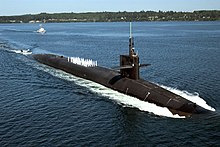first strike
First strike is a term from nuclear strategy . It describes an attack with nuclear weapons , carried out with the intention of immediately destroying all or at least most of the enemy’s nuclear weapons and launch systems.
Military strategic considerations
A first strike would only be promising if the attacked state has significantly fewer nuclear weapons than the attacker. Their positions should be known. In addition, the attacked person should not be able to fire his own weapons in time as a reaction to the attack ( “use them or lose them” ). Due to the continuous expansion of the second strike capacities of the two superpowers, roughly in line with the American strategy of mutual assured destruction , such a scenario appeared increasingly impossible in the course of the Cold War. An adequate means of holding off an opposing first strike was in particular the commissioning of a fleet of strategic submarines , explicitly intended for carrying out a devastating second strike using nuclear missiles. At least some of them were permanently inaccessible to an attacker, i. H. Hardly or not at all to be located on patrols. The presence of these strategic submarines made the risk of a first strike for a potential attacker "calculated intolerable" in theory.
The then American Defense Secretary Robert McNamara emphasized the importance of protection against a first strike in a speech:
“Let us first turn to another term: first strike ability. This is a somewhat ambiguous term, as it could initially only mean that one country has the option of attacking another with nuclear weapons first. In normal usage, however, it means much more, namely the extermination of the retaliatory forces to lead the second strike of the attacked country. It should be understood in that sense. […] Obviously, first strike capability is an important strategic concept. The United States cannot and will not allow it to get into a position where any other nation or alliance of nations has a first strike capacity against it. Such a position would not only be an intolerable threat to our security, but would undoubtedly deprive us of our ability to deter nuclear aggression. "
While reporting on Russian and Chinese hypersonic weapons in the 2010s, there was again talk of a first strike capability and an increase in the likelihood of nuclear war.
See also
Web links
Individual evidence
- ^ "Mutual Deterrence" Speech by Sec. of Defense Robert McNamara, San Francisco, September 18, 1967
- ↑ Experts warn: Super-fast missiles make nuclear war more likely , Stern, October 14, 2017
- ↑ The Cold War is eagerly awaited , Novaya Gazeta, August 5, 2019
